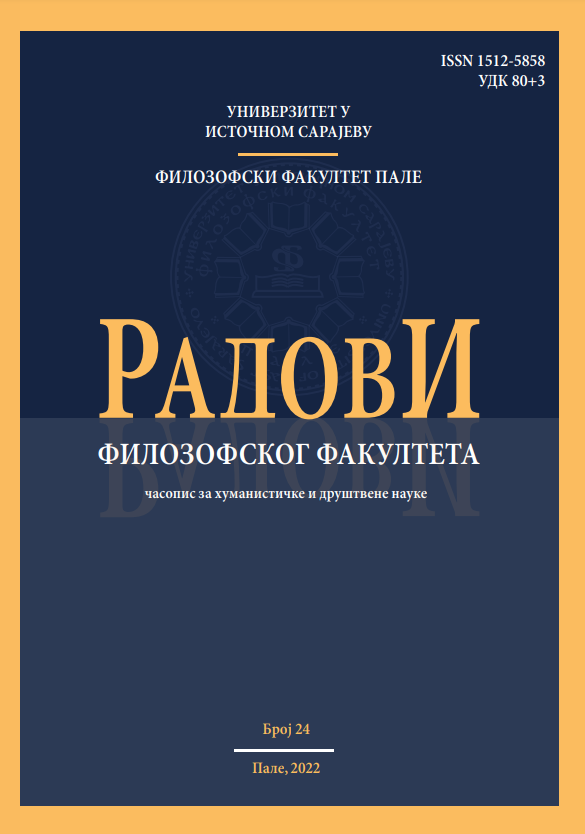ПАСТИРСКА ПСИХОЛОГИЈА КАО ДРУШТВЕНА КРИТИКА: ТЕОЛОШКО ЧИТАЊЕ ЏОРДАНА ПИТЕРСОНА
PASTORAL PSYCHOLOGY AS SOCIAL CRITIQUE: A THEOLOGICAL READING OF JORDAN PETERSON
Author(s): Vedran GolijaninSubject(s): Theology and Religion, Pastoral Theology, Psychology of Religion
Published by: Универзитет у Источном Сарајеву, Филозофски факултет Пале
Keywords: pastoral psychology; social critique; Jordan Peterson; culture; traditionalism; atheism; auto-chauvinism; Church;
Summary/Abstract: A dominant school of thought in Orthodox Christian pastoral theology is primarily based on ascetics. While ascetics certainly may be regarded as a specific kind of Christian psychology, it is mostly focused on individuals and their spiritual issues. However, ascetic thought presupposes a person living a monastic life, usually inside a monastery. Laypeople, living in the modern world, rely on an ascetic tradition for spiritual guidance and consolation, but one can hardly rely on ascetics for general solutions to social and cultural problems. In other words, pastoral psychology needs a wider social frame for a more complete analysis of modern individuals’ spiritual state.Vladeta Jerotić, who was a psychiatrist and a professor of pastoral psychology, laid the groundwork for social and cultural critique in pastoral psychology, mostly relying on Viktor Frankl’s theory of noogenic neurosis. Since Jerotić was not a trained theologian, his contribution to the development of pastoral psychology’s social critique was merely a stimulus for theologians to resume its construction on the foundations he laid.Jordan Peterson’s arguments against the extremes of postmodern ideologies in the West seem compatible with the Orthodox Church’s basic social and cultural stances, so the goal of this paper is to thoroughly explore his cultural theory and social critique, simultaneously comparing them to the social and cultural experience of the Serbian Orthodox Church. This is accomplished through the analysis of his archetypes of Order and Chaos, their interactions, and their respectable extremes: tyrannical tradition and anarchical innovation.Although the Orthodox Church is usually perceived as rigorously traditional, it actually often stands on moderate grounds, which means that the extremes of traditionalism, such as religious fundamentalism, present serious problems for its pastoral activity. Peterson’s analysis of tradition that transforms into tyranny offers some interesting insights that might help pastoral psychology in addressing fundamentalism as both theological and psychological issues.On the other hand, Peterson’s analysis of innovative thought that leads to the annihilation of tradition equips pastoral theology with arguments against two epiphenomena of a postmodern crisis of truth, namely atheism and “auto-chauvinism”. In the case of atheism, Peterson praises Christianity for many positive achievements of our civilisation, mostly in the field of ethics, while reminding atheists that their presumably secular values, such as human rights, are not based on science but on the Bible. Therefore, a true atheist does not exist, since their values reflect their inner beliefs that are, as it turns out, biblical in nature. The issue of auto-chauvinism is more complicated and more malign, since it is based on the dogmatic presupposition that Western culture is more superior to its eastern counterparts, and also on the belief that the Serbian culture is somehow “contaminated” by inner contradictions, by a necessity to outwardly project its evil and by natural nationalism that might quickly turn into Nazism. Needles to say, this kind of reasoning leads to completely unjustified proposals of Serbian “collective guilt”. The Serbian Orthodox Church is a usual target of auto-chauvinist propaganda because of its uniting cultural role in Serbian people, regardless of state boundaries. This extreme left ideology is quite similar to contemporary “woke” ideology in the West, which is of special interest for Peterson. His analysis of the extreme left and his arguments against it might be adopted in our Church’s pastoral psychology and used against auto-chauvinist propaganda.Theological critiques of Peterson’s ideas certainly do exist, but it would be wrong to completely reject them on the grounds of the supposed Peterson’s “defense of colonial legacy” or his treatment of Christ as an archetypal hero. Pastoral theology does not need to adopt the entirety of his ideas but only his completely valid arguments against extremes of fundamentalism, atheism, and auto-chauvinism, which certainly are serious problems in the Orthodox Church’s social and cultural mission.
Journal: Радови Филозофског факултета (часопис за хуманистичке и друштвене науке)
- Issue Year: 2022
- Issue No: 24
- Page Range: 121-143
- Page Count: 23
- Language: Serbian

